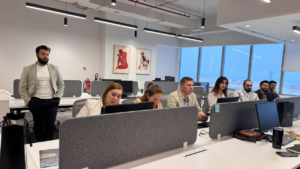Many companies only realize they need security consulting after an incident has already occurred or an audit has demanded evidence that no one has been able to provide. What seemed like a stable environment turns out to be full of vulnerabilities, and the rush to resolve issues replaces the prevention that should have been present from the start.
The challenge is understanding the right time to seek technical support before the pressure builds. In a scenario where the complexity of systems grows and the number of risks keeps pace, having external specialists has become an essential control point, not a luxury. Knowing when to hire a digital security consultancy is what determines whether the company reacts to the problem or prevents it from happening.
Why timing is the most overlooked aspect of security.
Security is often only treated as a priority after the scare. When there's a data breach, a fine for non-compliance, or an incident affecting operations, investment comes with urgency. The problem is that this reaction is costly, both financially and in terms of reputation.
In SaaS and e-commerce companies, the routine is fast-paced and the technical agenda is always full. It's common for critical tasks, such as access reviews, backup tests, or compliance audits, to be postponed. But "later" almost always arrives in the form of an incident.
Knowing when to involve a consultancy is, therefore, a matter of cybersecurity maturity. The consultancy comes in before the collapse, when it's still possible to correct vulnerabilities without compromising operations.
5 signs that your company needs consulting now
1. The technical team can no longer handle the volume of risks
With the growth of digital infrastructure, it's natural for the internal team to start dividing itself between maintenance, support, and specific incidents. When the team starts working in reactive mode, it's a sign that there are insufficient resources for in-depth planning and validation. Consulting helps precisely to re-establish the method and strategic focus.
2. Internal reports don't provide evidence
Reports without logs, traceability, and auditable documentation indicate security based on discourse. The document exists, but it doesn't withstand an external audit. A specialized consulting firm applies forensic criteria to ensure that the information can be proven and accepted in any technical or legal verification.
3. Audits are repeated, but so are the flaws
When compliance reports point to the same critical points every year, the problem has ceased to be technical and has become structural. This shows that the process is not being reviewed with the necessary detachment. Consulting firms bring the independent perspective that breaks this cycle and proposes corrective plans with objective criteria.
4. Security decisions depend on technical discourse, not proof
In many boards and committees, security decisions are made based on internal opinions. The problem is that an opinion is no guarantee. The board needs auditable data, not just presentations. Consulting firms provide technical documentation, vulnerability reports, and impact analysis to support investment and prioritization decisions.
5. There is neither time nor staff to review critical controls
Even with competent IT, reviewing access, policies, and integrations requires time and methodology. When the company depends on urgent routines and there is no dedicated team for review, gaps accumulate. A consultancy steps in to review the environment with technical detachment and propose practical measures, without compromising the flow of operations.
How does a specialized consulting firm operate?
A digital security consultancy plays the role of translating technical complexity into strategic decisions. It acts as a second, independent, and impartial perspective, validating the effectiveness of controls and identifying weaknesses before they cause an impact.
In the CISO as a Service model, this role goes beyond diagnosis. The specialist monitors the company's routine, guides board decisions, and ensures that every security investment has purpose and traceability. This includes:
Review of policies and business continuity plans
Vulnerability testing and technical audits
Documentation of evidence and logs
Monitoring compliance with LGPD, ISO 27001, and PCI DSS
Direct support to management in prioritizing risks
The difference lies in the methodology. The focus is not on selling tools, but on creating visibility into what truly protects the business.
What changes when you have experts working side-by-side with management?
When technical and executive management work together under expert guidance, security ceases to be merely an IT issue and becomes part of the company's governance.
Consulting doesn't replace the internal team; it broadens the perspective. The team continues operating, but with defined criteria and monitoring from someone who understands auditing, documentation, and technical evidence.
This presence reduces decisions based on intuition and increases predictability in incidents. The company gains faster responses, structured reports, and a reliable history—something that no single tool can deliver.
The practical impact is clear: audits become a validation of what is already under control, not a race to correct what has been overlooked.
Conclusion
Knowing when to hire a security consultancy is what separates prevention from improvisation. In a market where risks arise with every integration, the absence of an external perspective is not saving money, it's exposure.
Technically mature companies understand that the time to act is before a crisis. Consultancy brings method, documentation, and traceability—and that's what sustains continuity and trust.
Count on specialists who work side-by-side with management, without needing to hire an internal team. Our technical consultancy and CISO as a Service model clearly demonstrate where your security needs to evolve.





